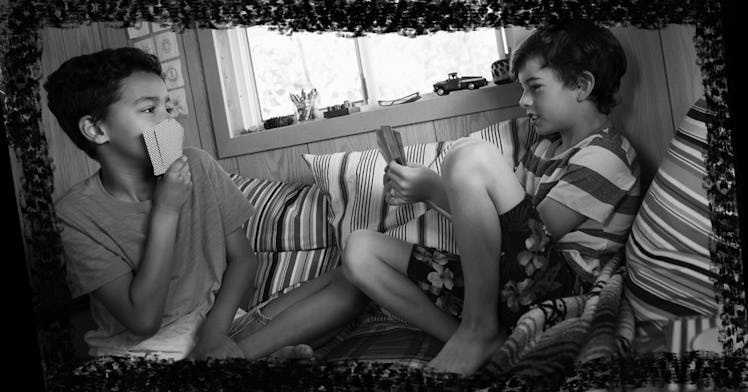I Don’t Have the Luxury of Being “Colorblind”
I find myself frustrated when well-meaning white parents utter such nonsense as, “I don’t raise my kids to see color. I wish we could all be colorblind."

When I was about nine-years-old, a friend from elementary school invited me to his house for a playdate. He was a white kid and I remember thinking that his family had a lot of money because they had fancy cars and a really big house. We ate junk food, watched television, and had a great time until the boy’s mom barged into the playroom and glared at me angrily.
“Empty your pockets,” she said pointing to my sweatshirt. I was frightened and didn’t move.
“Empty your pockets, now!” she yelled angrily.
I emptied everything out — a pack of gum, a few quarters to use at the arcade, and a some balls of lint. After realizing that I didn’t have what she was looking for, she stormed out of the room. I tried to keep myself together, but I was scared and started crying. My friend, who was confused and pissed off at his mom for shaking me down and upsetting me, decided to confront her while I sat alone in the room. I still have no idea what he said to her, but after 20 minutes or so, she came back and offered me this weak-ass non-apology:
“I’m sorry for snapping at you. I lost an expensive watch that was passed down to me from my grandmother and I thought you took it, because people like you have stolen from me before. I’m really sorry for accusing you.”
People like you. She actually said that to me. I can still hear those words today.
I asked to be driven home immediately. Sadly, my friendship with that boy — through no fault of his own — was never the same afterwards.
At that moment, nine-year-old me realized what racism is like. I was a polite and well-mannered kid who did absolutely nothing to give that woman an idea that I was a criminal. As a matter of fact, the only “crime” I committed that day was being Black. I was more aware of my color than I’d ever been before, and I still carry that awareness today.
Today, I’m the dad of two brown girls (my wife is half-white, half-Japanese), and I find myself frustrated when I encounter usually well-meaning white parents who utter such nonsense as, “I don’t raise my kids to see color. I wish we could all be colorblind.”
My first thought when I hear parents talking about “colorblind” children is, “Dang, those kids must really suck at playing checkers.” My second thought is how it’s complete bullshit. We all see color and it’s not something to run from, make excuses for, or ignore because that’s how the #AllLivesMatter nonsense started in the first place. What I’m hoping the folks who wish we could all be colorblind folks are clumsily attempting to articulate is they don’t want their kids to make judgments on people based on their skin color — which is the right way to go about it. But I’m here to say we have to go a step further.
A while ago, a white mom approached me to say she was mortified when her son referenced his classmate as his “Black friend, Jordan.” She wondered why he couldn’t just say his friend Jordan instead. I told her it’s a good thing because he’s aware that his friend is different from him and he’s using the limited tools at his disposal to acknowledge those differences. Eventually he’ll grow up to understand the nuances of racial differences without trying to put everyone in a homogenous bucket of life experiences. In other words, it’s about being racially conscious.
Racially conscious kids understand why some Black people feel tense around law enforcement. They also understand why some Black kids feel uncomfortable when placed in all-white/majority white environments. And they feel empathy towards Black kids who are followed in stores (or by bigoted parents) to ensure they don’t “steal anything.”
Quite frankly, the alternative — also known as viewing everyone as the same — is pretty awful. It means believing racism doesn’t exist (or that instances of racism are overblown), and that all of us have the same experiences no matter what our skin color is, which is 100 percent false. Hell, I wish I had the luxury of living in colorblind world where everyone was treated equally regardless of their skin color, but I don’t. I was made painfully aware of that as a 9-year-old and, as a dad, I’m tasked with teaching my daughters the same lessons today.
Memo to parents everywhere: please understand that raising colorblind kids (or being colorblind yourself) does much more harm than good. The fact is we’re all different and being different is amazing. The more we teach our kids to embrace our differences, they’ll come to the realization that what makes us unique is what makes us beautiful.